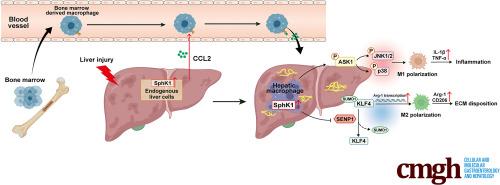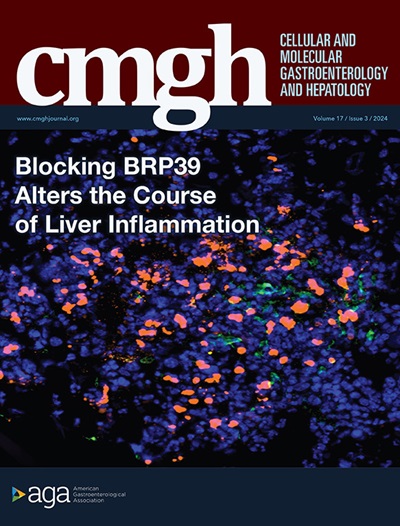Sphingosine Kinase 1 Aggravates Liver Fibrosis by Mediating Macrophage Recruitment and Polarization
IF 7.1
1区 医学
Q1 GASTROENTEROLOGY & HEPATOLOGY
Cellular and Molecular Gastroenterology and Hepatology
Pub Date : 2024-01-01
DOI:10.1016/j.jcmgh.2024.101406
引用次数: 0
Abstract
Background & Aims
Sphingosine kinase 1 (SphK1) has distinct roles in the activation of Kupffer cells and hepatic stellate cells in liver fibrosis. Here, we aim to investigate the roles of SphK1 on hepatic macrophage recruitment and polarization in liver fibrosis.
Methods
Liver fibrosis was induced by carbon tetrachloride in wild-type and SphK1-/- mice to study the recruitment and polarization of macrophages. The effects of SphK1 originated from macrophages or other liver cell types on liver fibrosis were further strengthened by bone marrow transplantation. The direct effects of SphK1 on macrophage polarization were also investigated in vitro. Expression analysis of SphK1 and macrophage polarization index was conducted with human liver samples.
Results
SphK1 deletion attenuated the recruitment of hepatic macrophages along with reduced M1 and M2 polarization in mice induced by carbon tetrachloride. SphK1 deficiency in endogenous liver cells attenuated macrophage recruitment via C-C motif chemokine ligand 2. Macrophage SphK1 activated the ASK1-JNK1/2-p38 signaling pathway to promote M1 polarization. Furthermore, macrophage SphK1 downregulated small ubiquitin-like modifier-specific peptidase1 to decrease de-SUMOylation of Kruppel-like factor 4 to promote M2 polarization. Finally, we confirmed that SphK1 expression was elevated and positively correlated with macrophage M1 and M2 polarization in human fibrosis livers.
Conclusions
Our findings demonstrated that SphK1 aggravated liver fibrosis by promoting macrophage recruitment and M1/M2 polarization. SphK1 in macrophages is a potential therapeutic target for the treatment of liver fibrosis.

球蛋白激酶 1 通过介导巨噬细胞的招募和极化加剧肝纤维化
背景与目的:球蛋白激酶1(Sphingosine kinase 1,SphK1)在肝纤维化过程中激活库普弗细胞(Kupffer cells,KCs)和肝星状细胞(hepatic stellate cells,HSCs)的过程中发挥着不同的作用。在此,我们旨在研究SphK1在肝纤维化中对肝巨噬细胞招募和极化的作用:方法:用四氯化碳(CCl4)诱导野生型小鼠和SphK1-/-小鼠肝纤维化,研究巨噬细胞的募集和极化。通过骨髓移植(BMT)进一步加强了源自巨噬细胞或其他肝细胞类型的 SphK1 对肝纤维化的影响。SphK1 对巨噬细胞极化的直接影响也在体外进行了研究。以人类肝脏样本为研究对象,对SphK1和巨噬细胞极化指数进行了表达分析:结果:SphK1缺失可减少CCl4诱导的小鼠肝巨噬细胞的募集,同时降低M1和M2极化。内源性肝细胞中 SphK1 的缺失通过 CCL2 减弱了巨噬细胞的招募。巨噬细胞SphK1激活了ASK1-JNK1/2-p38信号通路,促进了M1极化。此外,巨噬细胞SphK1还能下调小泛素样修饰物(SUMO)特异性肽酶1(SENP1),从而减少Kruppel样因子4(KLF4)的去SUMO化,促进M2极化。最后,我们证实SphK1表达升高,并与人纤维化肝脏中巨噬细胞M1和M2极化正相关:我们的研究结果表明,SphK1通过促进巨噬细胞募集和M1/M2极化而加重肝纤维化。巨噬细胞中的SphK1是治疗肝纤维化的潜在治疗靶点。
本文章由计算机程序翻译,如有差异,请以英文原文为准。
求助全文
约1分钟内获得全文
求助全文
来源期刊

Cellular and Molecular Gastroenterology and Hepatology
Medicine-Gastroenterology
CiteScore
13.00
自引率
2.80%
发文量
246
审稿时长
42 days
期刊介绍:
"Cell and Molecular Gastroenterology and Hepatology (CMGH)" is a journal dedicated to advancing the understanding of digestive biology through impactful research that spans the spectrum of normal gastrointestinal, hepatic, and pancreatic functions, as well as their pathologies. The journal's mission is to publish high-quality, hypothesis-driven studies that offer mechanistic novelty and are methodologically robust, covering a wide range of themes in gastroenterology, hepatology, and pancreatology.
CMGH reports on the latest scientific advances in cell biology, immunology, physiology, microbiology, genetics, and neurobiology related to gastrointestinal, hepatobiliary, and pancreatic health and disease. The research published in CMGH is designed to address significant questions in the field, utilizing a variety of experimental approaches, including in vitro models, patient-derived tissues or cells, and animal models. This multifaceted approach enables the journal to contribute to both fundamental discoveries and their translation into clinical applications, ultimately aiming to improve patient care and treatment outcomes in digestive health.
 求助内容:
求助内容: 应助结果提醒方式:
应助结果提醒方式:


